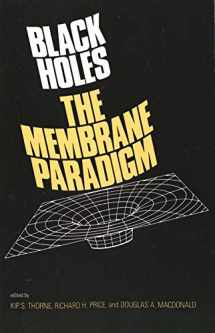
Black Holes: The Membrane Paradigm (The Silliman Memorial Lectures Series)
Book details
Summary
Description
This pedagogical introduction to the physics of black holes emphasizes the “membrane paradigm”, which translates the mathematics and physics of black holes into a form accessible to readers with little knowledge of general relativity but a solid grounding in nonrelativistic physics. This is accomplished without resort to approximations or loss of content.
Instead of treating a black hole’s “event horizon” as a globally defined null surface in four-dimensional space time, the paradigm views it as a two-dimensional membrane in three-dimensional space. Made of viscous fluid, electrically charged and conducting, with finite entropy and temperature but no power to conduct heat, this membrane is seen as having familiar properties that enable the reader to understand intuitively and compute quantitatively the behavior of black holes in complex astrophysical environments.


We would LOVE it if you could help us and other readers by reviewing the book
Book review




